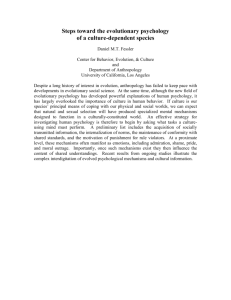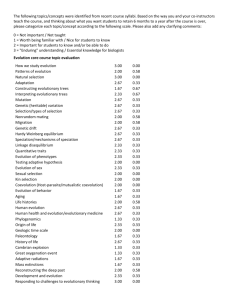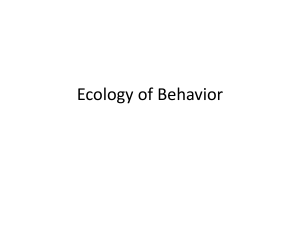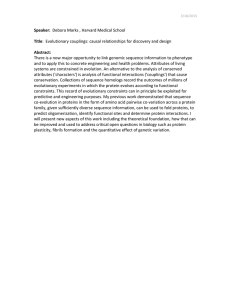TARGET ARTICLE Are Evolutionary Explanations Unfalsifiable? Evolutionary Psychology
advertisement
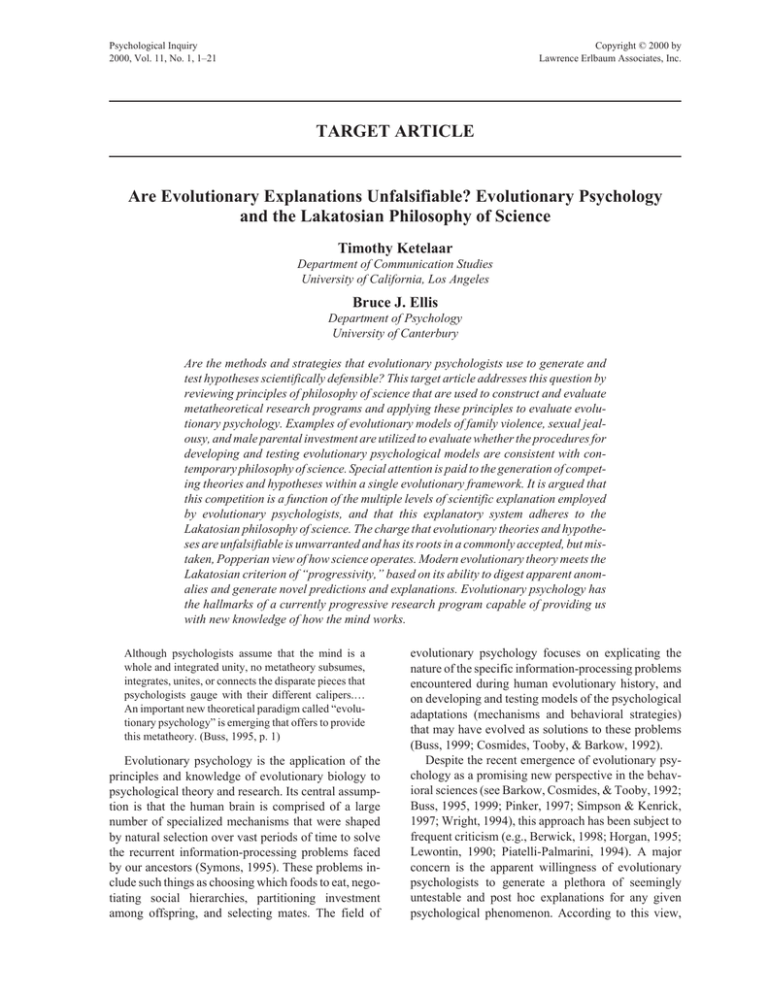
Psychological Inquiry 2000, Vol. 11, No. 1, 1–21 Copyright © 2000 by Lawrence Erlbaum Associates, Inc. TARGET ARTICLE Are Evolutionary Explanations Unfalsifiable? Evolutionary Psychology and the Lakatosian Philosophy of Science Timothy Ketelaar Department of Communication Studies University of California, Los Angeles Bruce J. Ellis Department of Psychology University of Canterbury Are the methods and strategies that evolutionary psychologists use to generate and test hypotheses scientifically defensible? This target article addresses this question by reviewing principles of philosophy of science that are used to construct and evaluate metatheoretical research programs and applying these principles to evaluate evolutionary psychology. Examples of evolutionary models of family violence, sexual jealousy, and male parental investment are utilized to evaluate whether the procedures for developing and testing evolutionary psychological models are consistent with contemporary philosophy of science. Special attention is paid to the generation of competing theories and hypotheses within a single evolutionary framework. It is argued that this competition is a function of the multiple levels of scientific explanation employed by evolutionary psychologists, and that this explanatory system adheres to the Lakatosian philosophy of science. The charge that evolutionary theories and hypotheses are unfalsifiable is unwarranted and has its roots in a commonly accepted, but mistaken, Popperian view of how science operates. Modern evolutionary theory meets the Lakatosian criterion of “progressivity,” based on its ability to digest apparent anomalies and generate novel predictions and explanations. Evolutionary psychology has the hallmarks of a currently progressive research program capable of providing us with new knowledge of how the mind works. Although psychologists assume that the mind is a whole and integrated unity, no metatheory subsumes, integrates, unites, or connects the disparate pieces that psychologists gauge with their different calipers.… An important new theoretical paradigm called “evolutionary psychology” is emerging that offers to provide this metatheory. (Buss, 1995, p. 1) Evolutionary psychology is the application of the principles and knowledge of evolutionary biology to psychological theory and research. Its central assumption is that the human brain is comprised of a large number of specialized mechanisms that were shaped by natural selection over vast periods of time to solve the recurrent information-processing problems faced by our ancestors (Symons, 1995). These problems include such things as choosing which foods to eat, negotiating social hierarchies, partitioning investment among offspring, and selecting mates. The field of evolutionary psychology focuses on explicating the nature of the specific information-processing problems encountered during human evolutionary history, and on developing and testing models of the psychological adaptations (mechanisms and behavioral strategies) that may have evolved as solutions to these problems (Buss, 1999; Cosmides, Tooby, & Barkow, 1992). Despite the recent emergence of evolutionary psychology as a promising new perspective in the behavioral sciences (see Barkow, Cosmides, & Tooby, 1992; Buss, 1995, 1999; Pinker, 1997; Simpson & Kenrick, 1997; Wright, 1994), this approach has been subject to frequent criticism (e.g., Berwick, 1998; Horgan, 1995; Lewontin, 1990; Piatelli-Palmarini, 1994). A major concern is the apparent willingness of evolutionary psychologists to generate a plethora of seemingly untestable and post hoc explanations for any given psychological phenomenon. According to this view,
